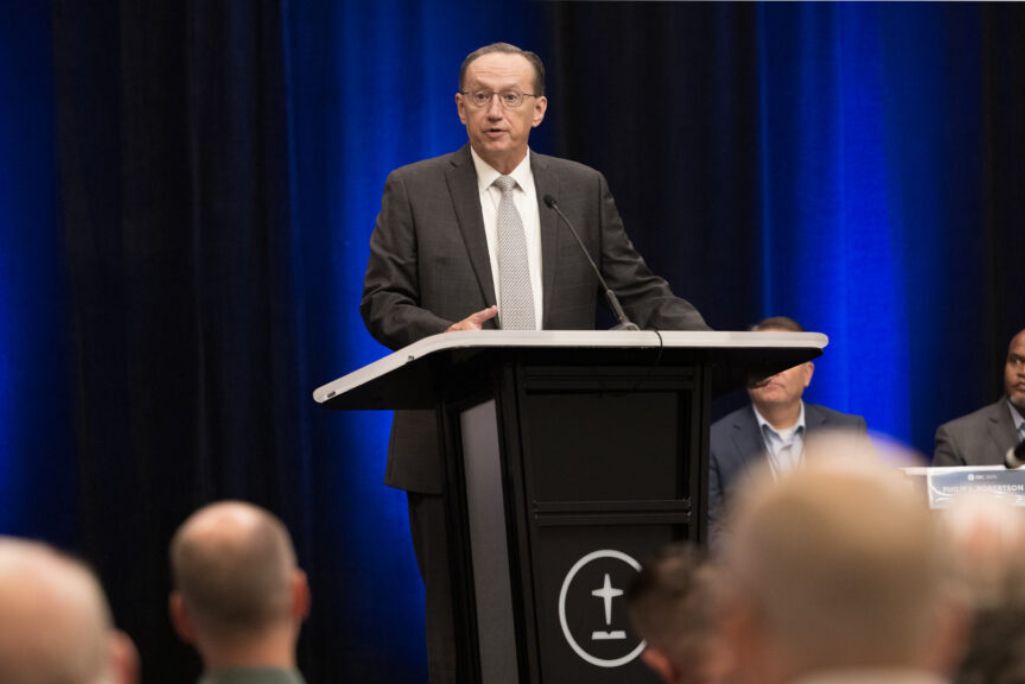
Feb. 12, 2025. It will be a Wednesday that I will never forget even though there is much about that day I do not remember. A day that I often spent preparing and finalizing notes for an evening Bible study would instead see me in an ambulance and others fighting for my life. It would eventually lead me to stepping away from pastoral ministry and entering a season of healing. But it was the reason that was most shocking to those who knew me.
Unbeknownst to anyone, early that morning I slipped out of the house and began to take steps to end my life. What unfolded over the next few hours and days can only be described as the work of a sovereign and graceful God. God, through many means and individuals, would intervene to save my life (again) and start me on a road to healing. After an emergency room visit and a week in a behavioral health center, I was prescribed a very prolonged sabbatical from ministry work. Each week now consisted of counselor visits and a lot of time to sit at the feet of Jesus.
So, how does a man of the cloth get to this point? How does a messenger of light end up with a mind full of dark thoughts and hopeless feelings? What had I missed during my 36 years of preaching and 21 years of being a lead pastor? To be clear, I did not make leaps and bounds into darkness. Instead, I stumbled and slid my way there incrementally. Since then, I have learned that this is not as uncommon as one might think among ministers.
Research by Barna in 2024 revealed that almost a quarter of the ministers surveyed had contemplated self-harm thoughts during the prior year, and almost 60% had dealt with some form of depression. A psychiatrist I spoke with at the behavioral health center said to me, “Oh, you are not the first minister we have seen.” This was in response to me sharing that a family member half-jokingly said to me that the staff probably thought, “Well this is a new one for us.” No, ministers are not immune to the struggles many parishioners face.
The real question that I have wrestled with since that day is how I should have handled the fears, the stress, the doubts, the disappointments and the regrets that had built up and plagued me mentally over the years. Do not misunderstand me. My life was filled with much joy as well. My family was a source of great comfort and happiness. There were ministry highlights. No one, and I mean no one, saw this coming. I know because many have told me. They said I seemed happy. I preached with passion. I counseled with Biblical wisdom. But, on the inside, in ways that even I did not fully appreciate, I was letting the negative build up and live uncontested in my brain.
During the day, I would go into automatic mode to do what I had to do. When the night came, I would sink to mental lows that had me dreading the next day to come. And in those dark moments, I failed to do what I knew to do. What I had preached to do. Again, this did not happen overnight. It was just one neglected discipline, one negative thought or one unhealthy habit that multiplied over time until the dam burst on that Wednesday morning.
In the months since, I have developed coping resources and tools to help with the stresses of life. I am still a work in progress, but I am making progress. I have had to remember and regain faith resources I had lost. There are three primary areas of focus that have helped the most:
1) Praying through things with God,
2) Talking through things with the right people,
3) Trusting God with the future.
Before that fateful day, I prayed. It is what we ministers do, right? But I had lost faith in prayer and I had lost effectiveness in prayer. In Matthew 26:38, after Jesus selected Peter, James and John to go pray with Him in the Garden of Gethsemane, He said, “I am deeply grieved to the point of death.” Those words from Jesus can seem quite shocking. The One who could heal the sick and raise the dead is deeply grieved (depressed) and feels like He is being crushed under the weight of it. This was Emmanuel, God with us, expressing a grief so strong that it felt like He might die from it.
Granted, what I struggled with was nowhere close to what Jesus faced at that moment, but emotionally I could relate. Or even better, it meant Jesus could relate to me. Psalm 34:18, a verse my wife gave to me while I was at the facility, states, “The LORD is near the brokenhearted; he saves those crushed in spirit.” I am sure many of us have been there in our own way. But it is what Jesus does with the grief, the weight, the stress that is significant to me. What He does is what I had neglected to do all those years. He prayed through it. Not just prayed. But prayed through it. Jesus prayed until the grief subsided and He was ready to face what comes next. He prayed until he was “OK” and knew He could go on in the will of the Father.
In the weeks following my suicide attempt, I began to practice this often. When fears arose, when doubts assailed, when the enemy came in like a flood, I prayed through it. James 5:17 says that when the prophet Elijah prayed, he prayed earnestly. The original language says he prayed with prayer. In other words, when he prayed, he really prayed. He prayed in faith and he prayed with perseverance. That is what Jesus did in the garden. That is what we must do through all our valleys. It means you do not stop praying until you are done. You do not stop praying until the Spirit of God frees you to stop. I am seeking to do that more.
Second, I am seeking to talk to others. Before, I did talk with those close to me. My wife and I communicate often and I share my thoughts and feelings. I have had counselors that I would meet with. But there were always things I did not share. It was not that I was necessarily hiding things. I just had inner thoughts and struggles that felt silly to highlight. I did not think they were that big of a deal. I am still learning how wrong I was.
I now share openly with those I can trust and know to have godly wisdom. I am honest even if I feel the thought or feeling is silly, fleeting, a one-off or scary. I share it with people I know will listen, care, not judge and walk with me through it. As James says, “confess your sins to one another.” (5:16)
And the third area, and possibly the hardest for me, has been learning to leave the future to God. My counselor pointed out how often he heard me “predicting” the future. He said that Scripture is clear we are not to do that and it is basically a form of false prophesying. That will get a preacher’s attention. I was guilty of talking about a situation and then declaring where it was going to lead. I would express worry about my kids and then assert how things were going to turn out. I would point out my own faults and what that meant for my future. None of which I knew for certain.
No matter what the facts are, no matter what the circumstances are, no matter what I may be able to see, hear or logically deduce, the reality is, I do not know the future. Only our Lord knows what tomorrow holds. James speaks to this by saying, “Yet you do not know what tomorrow will bring…If the Lord wills…” (v.14,15). So, I am seeking to pray without prediction. I am confessing without concluding. I am leaning into Jesus and leaving the results to Him. And, if my emotions start to get the best of me, if my thoughts get off track or fears well up, I pray through it. I talk through it. And, I leave the results to God. I do not lean on my own understanding, but instead trust Him with all my heart. I have not arrived yet. But I press on toward the prize.


